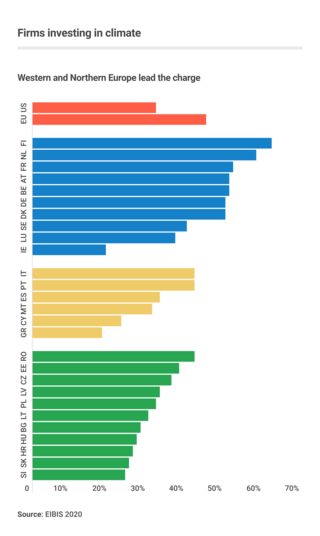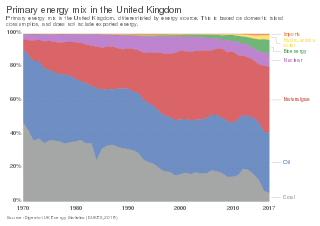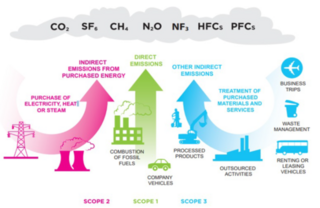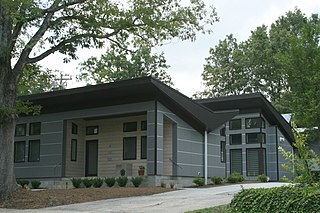The United Kingdom's Climate Change Programme was launched in November 2000 by the British government in response to its commitment agreed at the 1992 United Nations Conference on Environment and Development (UNCED). The 2000 programme was updated in March 2006 following a review launched in September 2004.
Interface, Inc. is a global manufacturer of commercial flooring with an integrated collection of carpet tiles and resilient flooring, including luxury vinyl tiles (LVT) and nora brand rubber flooring.

A carbon footprint (or greenhouse gas footprint) is a calculated value or index that makes it possible to compare the total amount of greenhouse gases that an activity, product, company or country adds to the atmosphere. Carbon footprints are usually reported in tonnes of emissions (CO2-equivalent) per unit of comparison. Such units can be for example tonnes CO2-eq per year, per kilogram of protein for consumption, per kilometer travelled, per piece of clothing and so forth. A product's carbon footprint includes the emissions for the entire life cycle. These run from the production along the supply chain to its final consumption and disposal.

Business action on climate change is a topic which since 2000 includes a range of activities relating to climate change, and to influencing political decisions on climate change-related regulation, such as the Kyoto Protocol. Major multinationals have played and to some extent continue to play a significant role in the politics of climate change, especially in the United States, through lobbying of government and funding of climate change deniers. Business also plays a key role in the mitigation of climate change, through decisions to invest in researching and implementing new energy technologies and energy efficiency measures.
Eco commerce is a business, investment, and technology-development model that employs market-based solutions to balancing the world's energy needs and environmental integrity. Through the use of green trading and green finance, eco-commerce promotes the further development of "clean technologies" such as wind power, solar power, biomass, and hydropower.

The energy policy of the United Kingdom refers to the United Kingdom's efforts towards reducing energy intensity, reducing energy poverty, and maintaining energy supply reliability. The United Kingdom has had success in this, though energy intensity remains high. There is an ambitious goal to reduce carbon dioxide emissions in future years, but it is unclear whether the programmes in place are sufficient to achieve this objective. Regarding energy self-sufficiency, UK policy does not address this issue, other than to concede historic energy security is currently ceasing to exist.

Carbon accounting is a framework of methods to measure and track how much greenhouse gas (GHG) an organization emits. It can also be used to track projects or actions to reduce emissions in sectors such as forestry or renewable energy. Corporations, cities and other groups use these techniques to help limit climate change. Organizations will often set an emissions baseline, create targets for reducing emissions, and track progress towards them. The accounting methods enable them to do this in a more consistent and transparent manner.

Aircraft engines produce gases, noise, and particulates from fossil fuel combustion, raising environmental concerns over their global effects and their effects on local air quality. Jet airliners contribute to climate change by emitting carbon dioxide, the best understood greenhouse gas, and, with less scientific understanding, nitrogen oxides, contrails and particulates. Their radiative forcing is estimated at 1.3–1.4 that of CO2 alone, excluding induced cirrus cloud with a very low level of scientific understanding. In 2018, global commercial operations generated 2.4% of all CO2 emissions.

The availability and uptake of green electricity in the United Kingdom has increased in the 21st century. There are a number of suppliers offering green electricity in the United Kingdom. In theory these types of tariffs help to lower carbon dioxide emissions by increasing consumer demand for green electricity and encouraging more renewable energy plant to be built. Since Ofgem's 2014 regulations there are now set criteria defining what can be classified as a green source product. As well as holding sufficient guarantee of origin certificates to cover the electricity sold to consumers, suppliers are also required to show additionality by contributing to wider environmental and low carbon funds.

A green-collar worker is a worker who is employed in an environmental sector of the economy. Environmental green-collar workers satisfy the demand for green development. Generally, they implement environmentally conscious design, policy, and technology to improve conservation and sustainability. Formal environmental regulations as well as informal social expectations are pushing many firms to seek professionals with expertise with environmental, energy efficiency, and clean renewable energy issues. They often seek to make their output more sustainable, and thus more favorable to public opinion, governmental regulation, and the Earth's ecology.
Green hosting or eco-friendly hosting is Internet hosting that involves strategies to reduce the environmental impact of their activities. These may include the increased use of renewable energy, planting trees, plants, and grass around and over data centers, and more day-to-day activities such as energy conservation and the use of energy-saving appliances.
The Renewable Fuels Agency (RFA) was a UK Government non-departmental public body, created by the Department for Transport to implement the Renewable Transport Fuel Obligation or RTFO. The Agency ceased to exist at midnight on 31 March 2011 The Renewable Fuels Agency (RFA) was the UK's independent sustainable fuels regulator. The agency awards Renewable Transport Fuel Certificates (RTFCs) to suppliers of biofuels in the UK, ensures companies meet their annual obligations and runs the RTFO's carbon and sustainability reporting system.

An aviation biofuel is a biofuel used to power aircraft. The International Air Transport Association (IATA) considers it a key element in reducing the environmental impact of aviation. Aviation biofuel is used to decarbonize medium and long-haul air travel. These types of travel generate the most emissions, and could extend the life of older aircraft types by lowering their carbon footprint. Synthetic paraffinic kerosene (SPK) refers to any non-petroleum-based fuel designed to replace kerosene jet fuel, which is often, but not always, made from biomass.

Green growth is a concept in economic theory and policymaking used to describe paths of economic growth that are environmentally sustainable. It is based on the understanding that as long as economic growth remains a predominant goal, a decoupling of economic growth from resource use and adverse environmental impacts is required. As such, green growth is closely related to the concepts of green economy and low-carbon or sustainable development. A main driver for green growth is the transition towards sustainable energy systems. Advocates of green growth policies argue that well-implemented green policies can create opportunities for employment in sectors such as renewable energy, green agriculture, or sustainable forestry.

A green home is a type of house designed to be environmentally sustainable. Green homes focus on the efficient use of "energy, water, and building materials". A green home may use sustainably sourced, environmentally friendly, and/or recycled building materials. This includes materials like reclaimed wood, recycled metal, and low VOC paints. Additionally, green homes often prioritize energy efficiency by incorporating features, such as high-performance insulation, energy-efficient appliances, and smart home technologies that monitor and optimize energy usage. Water conservation is another important aspect, with green homes often featuring water-saving fixtures, rainwater harvesting systems, and grey water recycling systems to reduce water waste. It may include sustainable energy sources such as solar or geothermal, and be sited to take maximum advantage of natural features such as sunlight and tree cover to improve energy efficiency.

Green building is a technique that aims to create structures that are environmentally responsible and resource-efficient throughout their lifecycle – including siting, design, construction, operation, maintenance, renovation, and demolition. A 2009 report by the U.S. General Services Administration evaluated 12 sustainably designed GSA buildings and found they cost less to operate.
Stranded assets are "assets that have suffered from unanticipated or premature write-downs, devaluations or conversion to liabilities". Stranded assets can be caused by a variety of factors and are a phenomenon inherent in the 'creative destruction' of economic growth, transformation and innovation; as such they pose risks to individuals and firms and may have systemic implications. Climate change is expected to cause a significant increase in stranded assets for carbon-intensive industries and investors, with a potential ripple effect throughout the world economy.
ISO 20121 is a voluntary international standard for sustainable event management, created by the International Organization for Standardization. The standard aims to help organizations improve sustainability throughout the entire event management cycle.

Sustainable film production is the concept of film production with particular concern for environmental, economic, and social issues. Sustainability in film production incorporates socially and environmentally responsible decision making into the pre-production and production of the film. It involves sustainable development principles at all levels of filmmaking and is best accomplished in a unified manner with collaboration and cooperation from all departments or participants in making the film. The sustainability of the film production should start at the launch of the project, and involve all of the key stakeholders including the director, film producer, production or costume designer, cast, and crew.

Pure Planet was a British energy supply company 24% owned by BP. The company, which was founded in 2015 and based in Bath, England, supplied electricity and gas to domestic customers in the UK. It ceased trading on 13 October 2021 following BP's withdrawal of support. On 17 October, Ofgem appointed Shell Energy as the new supplier of Pure Planet's customers.













